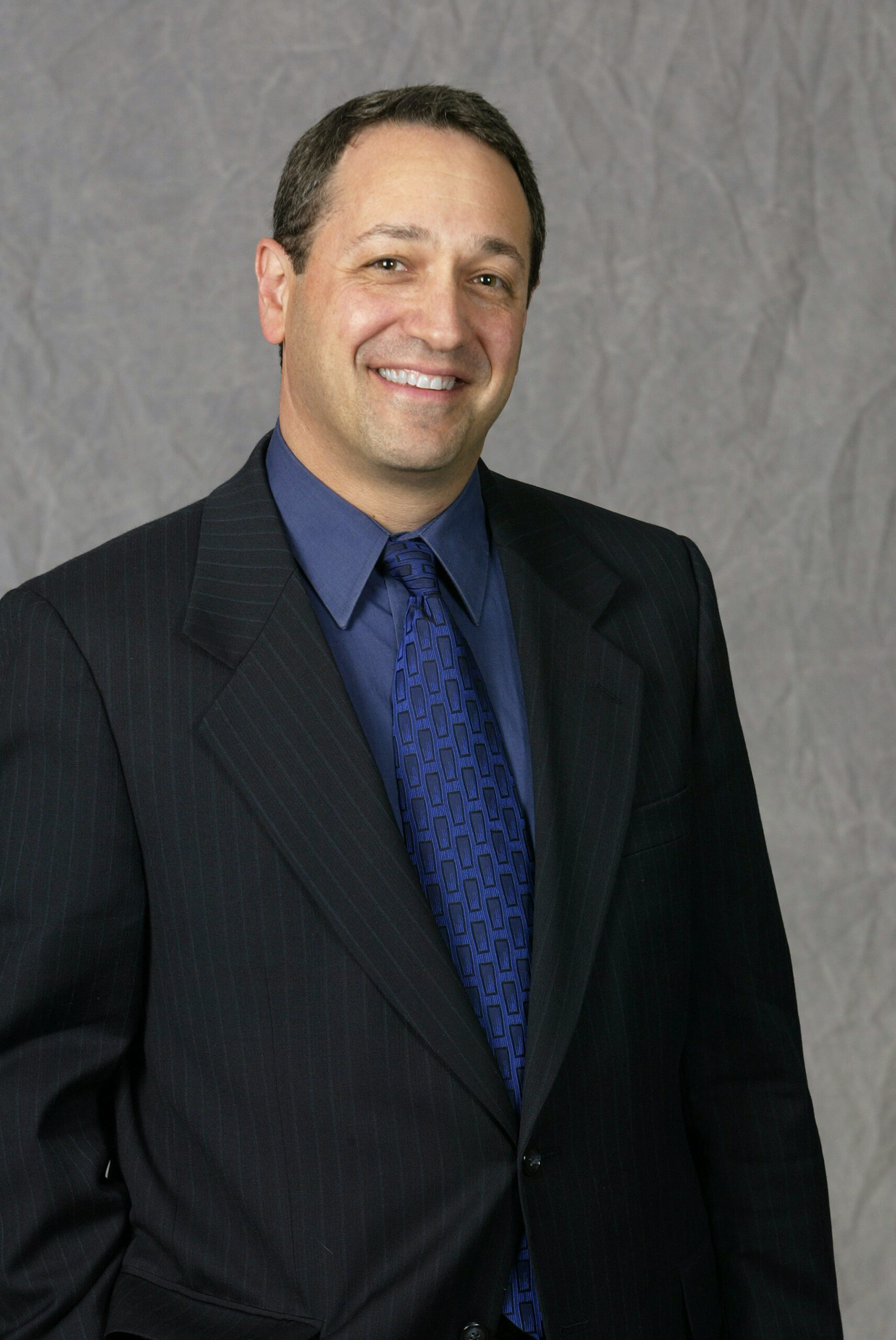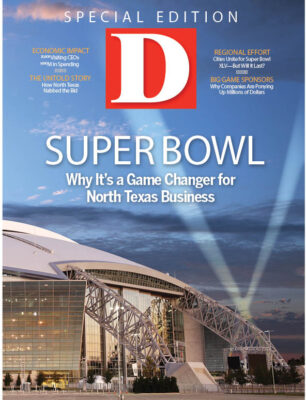Frank Supovitz is the NFL’s senior vice president for events. His 27-person staff guides the Super Bowl host-city selection process for the league and is charged with pulling together and staging the grand spectacle that’s come to be expected for the country’s biggest annual sporting event.
Super Bowl XLV, to be played at Arlington’s Cowboys Stadium on Feb. 6, will be Supovitz’s sixth go-round in “the captain’s chair” for putting on the big game. Since he first worked on an NFL championship game as an associate producer for Super Bowl XXII, he has seen the event’s reach and importance grow by an astounding order of magnitude.
We sat down with the league’s “special-teams coach” recently to talk about how he deals with the logistical nightmare involved in pulling off a spectacle of this scale—and why that pressure doesn’t keep him up at night.
D: Are you always working on two or three Super Bowls at a time?
Frank Supovitz: We’re always working on three or four. We’re booked through 2013, which sounds a lot farther away than it really is—which is New Orleans. We’ve already been down there for several planning meetings.
What’s different about North Texas compared to Miami, Phoenix, New Orleans, some of the other cities that have hosted recent Super Bowls?
You could point to some peculiarities of each of the regions that host the Super Bowl. I think what is particularly intriguing about [North Texas] is that you’ve got this magnificent stadium in Arlington, which is unlike anything anyone’s ever seen before or worked in before—with all the bells and whistles that will put “super” in Super Bowl, honestly. The other thing that’s intriguing about it is that every city within the region is very culturally different. You have a very contemporary, urban type of environment in Dallas. You have a very traditional Texan environment in Fort Worth. You’ve got all kinds of smaller municipalities in between. So depending on what kind of environment you want to create, with the events that you want to do, you have all kinds of opportunities in each of those places that are flavored by the city they’re in.
Is it typical to designate an AFC and an NFC host city in the region, as you’ve done this time with Dallas (NFC) and Fort Worth (AFC)?
This is the first time we’ve ever done that, and it may not be the last time we do it. We’ve done it without realizing we were doing it; we just didn’t name it. So, for example, for Super Bowl XLIV the NFC team stayed in Miami, but the AFC team stayed in Fort Lauderdale. We’ve done that on many occasions, but we’ve never really said “OK, Fort Lauderdale is the AFC city and Miami’s the NFC city.” This is the first time we’ve really given it that level of recognition … This is the first time where we’re actually doing multiples of the same event—Super Bowl Saturday Night being that event. That’s a big fan rally, concert, fireworks show the night before the game. We’re going to do one version in Fort Worth for the AFC fans and another in Dallas for NFC fans.
Do you have any concerns about the ability to get fans in and out the day of the game?
The fact is the Super Bowl, the dynamics of the Super Bowl in terms of when people get to the stadium, are different from a typical NFL game. I’m not characterizing how things are done here, because, again, [Cowboys Stadium] is very new. People are coming earlier to walk around the stadium, to discover and explore it. So the Super Bowl is going to be very similar to that because of the 93,000 or so people who will be at the game, probably 70,000 of them will be from somewhere else. They’ll want to come early, and we have to build facilities that will be able to host them and hold them and engage them for hours before the game. If you look at similar facilities around the Super Bowl, since kickoff here is at 5:30 p.m., we would see people before noon starting to park, show up, try to explore the neighborhood.
What’s the importance of marrying the Super Bowl with all these charitable efforts that are planned, such as the NFL’s Youth Education Town?
The community relations pieces of Super Bowl are part of what gives it its soul and is something that we work with the host committee very closely on. [See story, p. 92.] The NFL YET Center is something that’s been around for [nearly] 20 years. Whenever we host a Super Bowl somewhere, we fund and oversee the construction of a Youth Education Town, which is essentially a recreation center for generally low-income, at-risk youth … In this particular case, it’ll be built in Arlington.
The NFL Special Events staff, and representatives from the league’s partners and sponsors, began visiting North Texas last fall to familiarize themselves with the region and the amenities and venues here. What is it that they’re looking for that is different from what they see in other host cities?
Well, I think it’s a voyage of discovery, frankly. The majority of our staff, at least, has never worked on a major event here. They’ve worked on business meetings that might have been here, but they’ve never worked on a major program like Super Bowl where really every corner of the marketplace is engaged. That’s really exciting that we’ve got that opportunity. We usually do four planning weeks a year, which are generally in April, June, October, and December. We really do these very deep dives into what I just discussed.
So the planning meeting scheduled for April will really kick your focus on Super Bowl XLV into high gear?
Right now you’re in a combination of planning and execution mode; by the time you get past the June meeting, you’re in execution mode. Which is: now we know what we want to do, now we know where we’re going to do it; now what are we going to do, and how are we going to get it done? Then by October you’re pretty well set in stone on everything. And December’s your final meeting: here’s your last kick at the can, what’s wrong with this picture? Generally by then everyone knows what’s going on.
Is your staff camped out in North Texas by December, then?
Usually by the second week of January we’ll start opening up our offices here; about three or three and a half weeks before [the Super Bowl]. The first major activity for us, anyway, which won’t be anything that anyone sees but us, is the four teams that are still in the hunt will come here, and we’ll spend two days with their advance teams, showing them the stadium, showing them the practice facilities, the hotels they’ll be using, having them meet the contractors they’ll be tapping into for transportation or outfitting of their practice facilities. We’ll spend two very intensive days with them on Super Bowl planning. Then obviously two of them will end up here, opening their offices the day after the [conference] championship games. But that’s the first thing that will happen.
What’s your nightmare scenario for the Super Bowl? What keeps you up at night when you’re in the process of planning a big event like this?
I don’t have problems sleeping at night. Exhaustion takes care of that. You know, the challenge of every event is different. The outside stimuli are different. If you’re asking me what would keep me up in North Texas, as opposed to what would keep me up in South Florida, I haven’t come up with it yet. What I would be concerned about here is that we’ll have a Pro Bowl in Hawaii a week before the Super Bowl here. Managing that is going to be an area of intense scrutiny because I’ve got to have a staff in Hawaii preparing for the Pro Bowl, while I have a staff in the conference championship cities, while I have a staff here getting ready for what people expect will be a massive Super Bowl. That’s both daunting and exciting at the same time because we’ve never really done that, or had to do it. And obviously there’s a time difference that’ll be working against us a little bit [in coordinating the efforts].
What factors have tripped up the logistics of Super Bowls in the past? Weather? Transportation?
Name it. The best way to describe it is if you’re a pilot and there are crosswinds when you’re flying in a straight line. There are mid-course corrections all the time. The autopilot keeps bringing you back to where you want to be. Super Bowl is exactly the same way. There’s always these mid-course corrections and little tweaks here or there. I could rattle off probably a dozen of them without thinking: everything from having some concerns that the halftime clock is ticking and you know the stages aren’t going to be off the field by the time the players get on the field. How do you manage those kinds of issues? We had that happen in Detroit with the Rolling Stones. I had to hold the clock, the halftime clock, for 90 seconds at a time when I knew the players would still be in the locker room because I knew that we wouldn’t be able to be ready in time. That’s a mid-course correction, those kinds of things. The weather at Super Bowl XLI was a mid-course correction. It poured rain, and we had a halftime show that had to get out, media that were exposed, and a field that was getting soggy, and those kinds of things. It really is second-to-second monitoring the telemetry, honestly.





